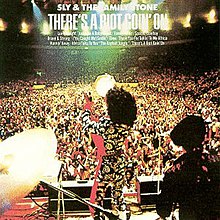| There's a Riot Goin' On | ||||
|---|---|---|---|---|
 | ||||
| Studio album by | ||||
| Released | November 1, 1971 | |||
| Recorded | 1970–71 | |||
| Studio | The Record Plant (Sausalito) | |||
| Genre | ||||
| Length | 47:33 | |||
| Label | Epic | |||
| Producer | Sly Stone | |||
| Sly and the Family Stone chronology | ||||
| ||||
| Alternative cover | ||||
 1986 LP reissue[6] | ||||
| Singles from There's a Riot Goin' On | ||||
| ||||
There's a Riot Goin' On is the fifth studio album by the American funk and soul band Sly and the Family Stone. It was recorded from 1970 to 1971 at Record Plant Studios in Sausalito, California and released later that year on November 1 by Epic Records.[7] The recording was dominated by band frontman/songwriter Sly Stone during a period of escalated drug use and intra-group tension.
With the album, Sly and the Family Stone departed from the optimistic sound of their previous music and explored a darker, more challenging sound featuring edgy funk rhythms, a primitive drum machine, extensive overdubbing, and a dense mix. Conceptually and lyrically, There's a Riot Goin' On embraced apathy, pessimism, and disillusionment with both Stone's fame and 1960s counterculture amid a turbulent political climate in the United States at the turn of the 1970s, influenced by the decline of the civil rights movement and the rise of the Black Power movement. The album's title was originally planned to be Africa Talks to You, but it changed in response to Marvin Gaye's album What's Going On (1971), released six months before Riot.[8]
A commercial success, There's a Riot Goin' On topped the Billboard Pop Album and Soul Album charts, while its lead single "Family Affair" reached number one on the Pop Singles chart.[9][10] The album was eventually certified platinum by the Recording Industry Association of America (RIAA) for sales of at least one million copies in the US.[11] Originally released to mixed reviews, the album has since been praised as one of the greatest and most influential recordings of all time, having impacted the funk, jazz-funk, and hip hop genres in particular. It has appeared in publications' best-album lists, including Rolling Stone's "500 Greatest Albums of All Time", on which it placed 99th in 2003[12] and 82nd in 2020.[13]
In 1999, the album was inducted into the Grammy Hall of Fame.[14]
- ^ Cite error: The named reference
Allwas invoked but never defined (see the help page). - ^ Cite error: The named reference
dos1was invoked but never defined (see the help page). - ^ Cite error: The named reference
Lundywas invoked but never defined (see the help page). - ^ Cite error: The named reference
brwas invoked but never defined (see the help page). - ^ Rabaka, Reiland (2013). The Hip Hop Movement From R&B and the Civil Rights Movement to Rap and the Hip Hop Generation. Lexington. p. 249. ISBN 9780739181171.
- ^ "Sly & The Family Stone - There's A Riot Goin' On - Vinyl LP - 1986 - US - Original". hhv.de. Retrieved June 6, 2021.
- ^ Record World, Nov. 6, 1971, p. 18
- ^ Lewis 2006, pp. 70–72.
- ^ There's a Riot Goin' On > Charts . All Media Guide, LLC. Retrieved on 2008-08-16.
- ^ 0 Billboard.com – Search Results: Family Affair Sly (singles charts)[dead link]. Nielsen Business Media. Retrieved on 2008-08-16.
- ^ RIAA Searchable Database. RIAA. Retrieved on 2008-08-16.
- ^ "RS500: 99) There's a Riot Goin' On". Rolling Stone. Archived from the original on March 16, 2006. Retrieved 2008-08-16.
- ^ "The 500 Greatest Albums of All Time - Sly and the Family Stone, 'There's a Riot Goin' On'". Rolling Stone. 22 September 2020. Retrieved 2020-09-30.
- ^ "GRAMMY Hall Of Fame | Hall of Fame Artists | GRAMMY.com". grammy.com.